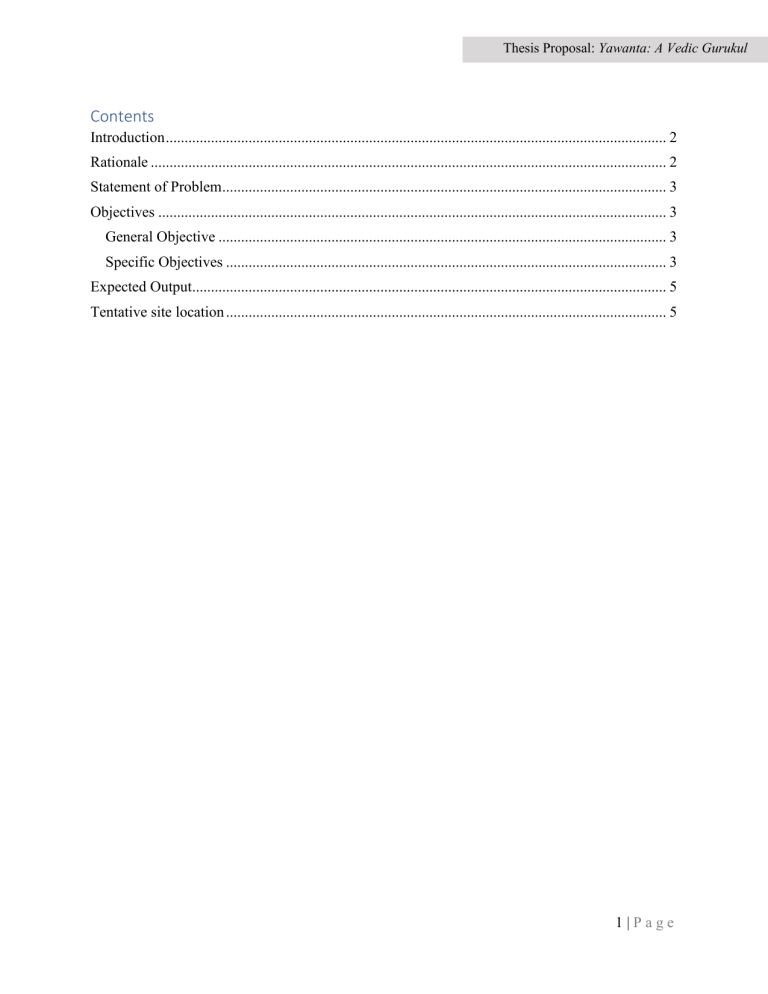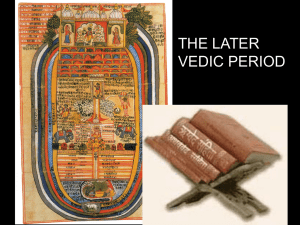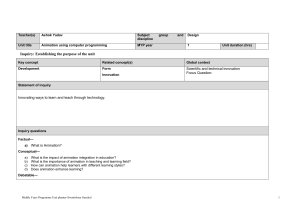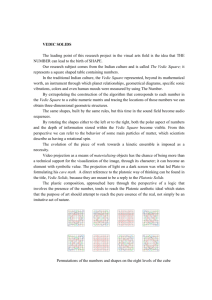Yawanta: Vedic Gurukul Thesis Proposal - Education & Architecture
advertisement

Thesis Proposal: Yawanta: A Vedic Gurukul Contents Introduction ..................................................................................................................................... 2 Rationale ......................................................................................................................................... 2 Statement of Problem ...................................................................................................................... 3 Objectives ....................................................................................................................................... 3 General Objective ....................................................................................................................... 3 Specific Objectives ..................................................................................................................... 3 Expected Output.............................................................................................................................. 5 Tentative site location ..................................................................................................................... 5 1|Page Thesis Proposal: Yawanta: A Vedic Gurukul Introduction In a fast-paced and rapidly evolving world, the quest for knowledge and wisdom remains a timeless pursuit. Throughout history, different societies have devised diverse systems of education to impart knowledge, nurture values, and cultivate holistic growth. Among these, the Vedic system of education, epitomized by the ancient Indian Gurukul tradition, stands as a beacon of timeless wisdom and holistic learning. The Gurukul system, deeply rooted in the ancient Vedic scriptures, offered an immersive and profound approach to education. Students, known as Shishyas, lived with their teachers, or Gurus, imbibing not only academic knowledge but also ethical values, spiritual insights, and life skills. This harmonious blend of education, character development, and self-realization laid the foundation for producing well-rounded individuals who contributed significantly to their communities and society at large. Despite the changing tides of time and the advent of modern educational paradigms, the core principles of the Gurukul system continue to hold relevance. This thesis project, entitled "Yawanta: A Vedic Gurukul," endeavors to explore, understand, and revitalize the essence of this ancient educational model for application in the context of the contemporary world. The primary aim of this thesis is to examine the historical significance of the Gurukul system, trace its evolution through the ages, and identify the key principles that contributed to its effectiveness. Additionally, it seeks to assess the present-day challenges faced by formal education systems and explore how elements of the Gurukul system can be incorporated to foster a more holistic and comprehensive approach to learning. Through extensive research, analysis of ancient texts, and engagement with educational experts, this thesis aspires to propose a model for modern Gurukuls that can bridge the gap between tradition and innovation. By adapting and integrating the best practices of the Gurukul system with contemporary educational methodologies, we can envision a more balanced and nurturing learning environment that nurtures not just knowledge but also character, values, and emotional intelligence. The word “Yawanta” is a Sanskrit adjective which carries the meaning, everything that is contained, the whole, unchanged. This thesis project is hereby proposed to promote the essence of Vedic education system and its practices by establishing a Vedic Gurukul that explores diverse knowledge bases and ancient wisdom. The name, Yawanta symbolizes a hope that everything that one needs to run his life is learnt from here. Hence, “Gurukul” aspires to be a journey of rediscovering and revitalizing the ancient wisdom of the Vedic system of education, bringing its timeless teachings to bear on the challenges of education in the 21st century. By embracing the values of our past, we seek to create a future that celebrates the holistic development of individuals, fostering compassionate and enlightened citizens who can positively impact the world. Rationale The choice of the thesis topic " Yawanta: A Vedic Gurukul " stems from the recognition of an inherent gap in the present-day education system. As societies progress and evolve, there arises a growing concern about the narrow focus on academic achievement while neglecting the holistic development of individuals. The rationale behind this thesis project lies in the belief that the ancient Vedic system of education, exemplified by the Gurukul tradition, holds valuable insights that can offer meaningful solutions to address this imbalance. Some of the aspects that it can help are preserving cultural heritage, holistic approach to learning, nurturing ethical values, fostering 2|Page Thesis Proposal: Yawanta: A Vedic Gurukul individuality and creativity, addressing contemporary challenges, promoting lifelong learning, cultivating global citizenship. Statement of Problem Today's children are experiencing diverse mental and physical health problems, unlike the Vedic period when people were notably healthier. So, understanding the source of this difference by examining the lifestyle and practices of that era would be of great help for todays generation. Number of people with knowledge of Vedas is decreasing. Sanskrit and Vedic education are essential aspects of Eastern civilization, encompassing vast knowledge in diverse fields. However, today's generation often overlooks their profound impact, viewing Sanskrit merely as an academic language, neglecting its broader significance in traditional practices and wisdom. Many Nepalese students are compelled to travel to and stay in India to pursue such courses regarding Hindu practices and society. Objectives General Objective To explore about the ancient gurukul system of education and its elements for designing a present day Gurukul incorporating today’s teaching-learning techniques. Specific Objectives 1. To understand the guiding principles and different elements of gurukul education system. 2. To know about the different subject aspects studied under Gurukul and their designing approach. 3. To understand the lifestyle and practices of Vedic Gurukul and follow the ones which would be relevant in present context. 4. To understand the elements of present-day teaching-learning techniques as an add up to gurukul system. 5. To visualize the significance and relation of ancient scripts (grantha) and mythologies of Hinduism with Nepalese architecture. Proposed methodology The procedure to carry out the project will be done in following manner: Selection of the topic and study of its scope It is necessary to carefully assess the topic's entire scope and theme. This procedure will be a precursor in learning how various Hindu legends and myths relate to our way of life and architecture. 3|Page Thesis Proposal: Yawanta: A Vedic Gurukul Problem identification The procedure will assist in identifying the current issues and difficulties and focus on how the results can address them. The problem associated to the teaching and learning of principles related to our “Sanatana Dharma” will be identified so as the research can deliver an amicable and practical solutions to it. Literature study o Research papers and book to develop understanding of our ancient system of education through gurukul. o Study of different religious books to depict the original essence of space. o Research on spatial arrangement of different units o Various architectural standards on designing of school from books and internet sources in written and graphical forms. Case Studies o Case Study of various such Gurukuls and Ashrams present in Nepal for understanding the present situation of these institutions. o Case Study of regional level Universities and Colleges to comprehend their overall functional process. o Comparative analysis of the Vedic Gurukul of both national and regional context. Interviews This process will incorporate interviews with religious scholars, gurus, current and past students of the Ashrams, experts as well as key informants associated with the project, not just physically but also emotionally to have a broader sense of their values and sentiments that are to be associated in design. Analysis and evaluation The analysis and evaluation of the overall research is to be done in order to have a good understanding as well as critical review of the various dimensions associated with the project. Site selection and analysis In any project carrying great religious as well as societal values like this one, selection of site plays crucial role to achieve desired quality of the design. For this purpose, it would be better if the site carries some religious significance. Furthermore, the location must be conveniently accessible from all parts of the country. Program formulation In this process, allocation of overall spaces will be done being based on various studies, existing norms and standards, comparative analysis and other references. This process will aim to materialize the functional and spatial requirements of the Vedic Gurukul. Conceptual design development 4|Page Thesis Proposal: Yawanta: A Vedic Gurukul The conceptual design development will aim to address the relevant programs and deduce a mass of a correctional unit. The spatial organization shall work on both: o Massing and volume o Relationship between built and open spaces Final design Development The final design shall be the result of an organized design process that is supervised. It has to acknowledge and honor the project's sentiments, philosophies, guidelines, and other elements. Expected Output The expected outputs of the research are: Research oriented output: o Broad understanding of the importance of a Vedic Gurukul in present context of Nepal. o Detail study of the impact of the Gurukul on the local community and the country overall o The interests of younger generation and the historic, spiritual, and scientific aspects of Hindu religion shall be synchronized efficiently. o A community of disciples, teachers, scholars and experts from different areas shall be formed for sharing knowledge and experiences. o Innovative design standards shall be figured out from the co-ordination between scholars and architects based on the ancient sentiments and present needs in context of planning. Design oriented output: o Final design of the Vedic Gurukul fulfilling all the goals set. o Overall set of architectural drawing including masterplans, detailed plans, sections, elevations and 3ds with good visualization. Tentative site location The site will be located inside Kathmandu valley or in the neighboring district of Kathmandu like Kavrepalanchowk, Makwanpur, Chitwan, Dhading. The first priority for site selection shall be Kathmandu Valley because it is a hub of Hindu pilgrimage, thanks to large number of temples and monuments. Furthermore, Kathmandu being the capital city of Nepal located at the central region of the country, it can be considered as highly accessible from all over the country. But nowadays, it is quite difficult to acquire big plot of empty land in Kathmandu valley due to abundance of building and structures. So, the neighboring districts to Kathmandu valley like Kavrepalanchowk, Makawanpur, Dhading or 5|Page Thesis Proposal: Yawanta: A Vedic Gurukul Chitwan can be considered as a second option for site selection as they are as accessible as Kathmandu valley, if not the religious hub. 6|Page



